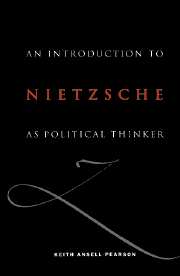Book contents
- Frontmatter
- Contents
- Acknowledgements
- Note on the texts and abbreviations
- Chronology of Nietzsche's life
- Introduction
- A note on Nietzsche and liberalism
- I THE QUESTION OF NIETZSCHE
- II ANCIENTS AND MODERNS
- III MAN AND OVERMAN
- IV THE QUESTION OF NIETZSCHE NOW
- 8 Nietzsche and contemporary liberalism
- 9 Nietzsche and feminism
- 10 The perfect nihilist
- Notes
- Bibliography
- Guide to further reading
- Index
9 - Nietzsche and feminism
Published online by Cambridge University Press: 10 November 2009
- Frontmatter
- Contents
- Acknowledgements
- Note on the texts and abbreviations
- Chronology of Nietzsche's life
- Introduction
- A note on Nietzsche and liberalism
- I THE QUESTION OF NIETZSCHE
- II ANCIENTS AND MODERNS
- III MAN AND OVERMAN
- IV THE QUESTION OF NIETZSCHE NOW
- 8 Nietzsche and contemporary liberalism
- 9 Nietzsche and feminism
- 10 The perfect nihilist
- Notes
- Bibliography
- Guide to further reading
- Index
Summary
The basic error and the most elementary human blindness is not a refusal to acknowledge death, but a refusal to remember birth, that one was born.
Peter Sloterdijk, ‘Eurotaoism’ (1988)INTRODUCTION
If Nietzsche seems an unlikely source for a radicalised liberalism, then he must be regarded as an even unlikelier source for a radicalised feminism. Nevertheless, this is how his work has been interpreted in recent years in some quarters. I will examine how certain feminist writers have responded to the challenge of Nietzsche's work and dealt with its tensions. The consensus which seems to be emerging is that the most fertile aspect of his writings for the formulation of a feminist philosophy lies not in their overt pronouncements on women, but in their ‘style(s)’, in their attempt to communicate a philosophy of the body, in their disclosure of the metaphoricity of philosophical discourse, and in the exemplary way in which they are seen to deconstruct the ‘phallogocentric’ bias of Western thought and reason. It is perhaps no coincidence that the deployment of Nietzsche – the philosopher of difference, according to Gilles Deleuze – by feminist writers is taking place at the same time that radical political theorists, including feminists, are seeking to articulate a philosophy of otherness and difference. A number of feminists have argued that it is necessary to go beyond the impasse of equality, in which women gain equality only by assuming the identity of men and hence effacing sexual difference.
- Type
- Chapter
- Information
- An Introduction to Nietzsche as Political ThinkerThe Perfect Nihilist, pp. 180 - 198Publisher: Cambridge University PressPrint publication year: 1994



